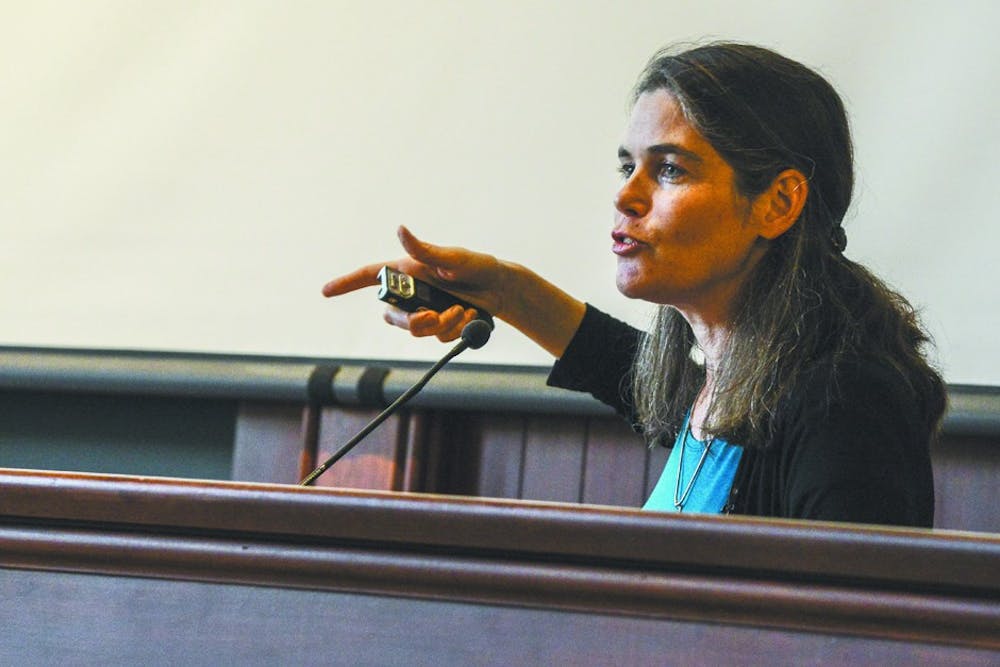Less than a year ago, 20 people were injured and one killed in a stampede over admission to South Africa’s University of Johannesburg.
Daphne Koller, co-founder and CEO of the free online course provider Coursera, hopes to end the education scarcity that produced this tragedy. Koller spoke to a full audience in College Hall Thursday afternoon about her company’s mission.
Her presentation, entitled “The Online Revolution: High-Quality Education for Everyone,” began with the social justice implications of Coursera. “We have come to the point in this modern world where it is very difficult for a person to make a good life for themselves without access to good education,” she said. Coursera aims to bring this access to anyone in the world with Internet connection.
Today, there are 33 universities around the world offering a total of 198 classes through Coursera. Unlike most online course options, Coursera attempts to offer mass education without sacrificing quality. “They have selected the best professors from the best universities,” said College and Engineering senior Pratham Mittal, who has already taken three classes through Coursera. “They haven’t compromised even a little bit on that.”
However, Koller recognizes that there is more to a classroom experience than great professors, since students learn best from active participation. But do large lectures actually give students this opportunity?
“When I ask a question in class, 80 percent of the students are still scribbling down what I just said,” said Koller, who teaches at Stanford. “There’s that group in the back row that’s on Facebook, and then there’s a smarty pants in the front row who comes out with the answer before everyone has the chance to realize that the question has even been asked.”
She added, “So the question is answered, the class moves on, and very few people had a chance to really engage with it.”
Because it is online, Coursera also allows its students to learn at their own pace. “You can actually go back and see the lecture all over again, pause or take a quiz in the middle of class,” Mittal said. “You also get really good feedback, which is not really common with other online learning platforms.” Coursera employs a number of grading methods, including multiple choice and numerical answers.
Related
10/3/12: The DP sits down with Law School professor Ed Rock
However, for business, humanities and social science classes, these cut-and-dry evaluations would not leave room for deeper analysis, Koller said. Because there is no way for a single professor and a few teaching assistants to read tens of thousands of essays, many assignments are graded by peer evaluation. Instructors issue grading rubrics as guidelines, and students are required to practice grading sample essays.
“Only when they demonstrate that they are in the ballpark of what the instructor is looking for are they then declared qualified to grade the work of their peers,” Koller said. While this seems like a watered-down method of grading, Koller maintains that peer evaluations are no less accurate than “two tired TAs grading the same piece of work.”
Freed of the constraints of the one-hour time slot, many Coursera professors also choose to post optional videos and discussions for interested students. “This allows us to break free from the ‘one size fits all’ model of education,” Koller said.
Deirdre Woods, interim executive director of Penn’s Open Learning Initiative, spoke about Coursera’s potential to impact in-class learning. Since all students’ homework responses and quiz and test scores are saved in databases, she asked, “wouldn’t it be interesting to study this data to understand more about online teaching and learning?”
Koller finished her speech by putting Coursera into a global context.
“We don’t know where talent is hidden. The next Steve Jobs might be living in Africa or Bangladesh,” Koller said. “If we give that person access to this kind of education, allow them to live up to their potential, then maybe they will make the world a better place for all of us.”



